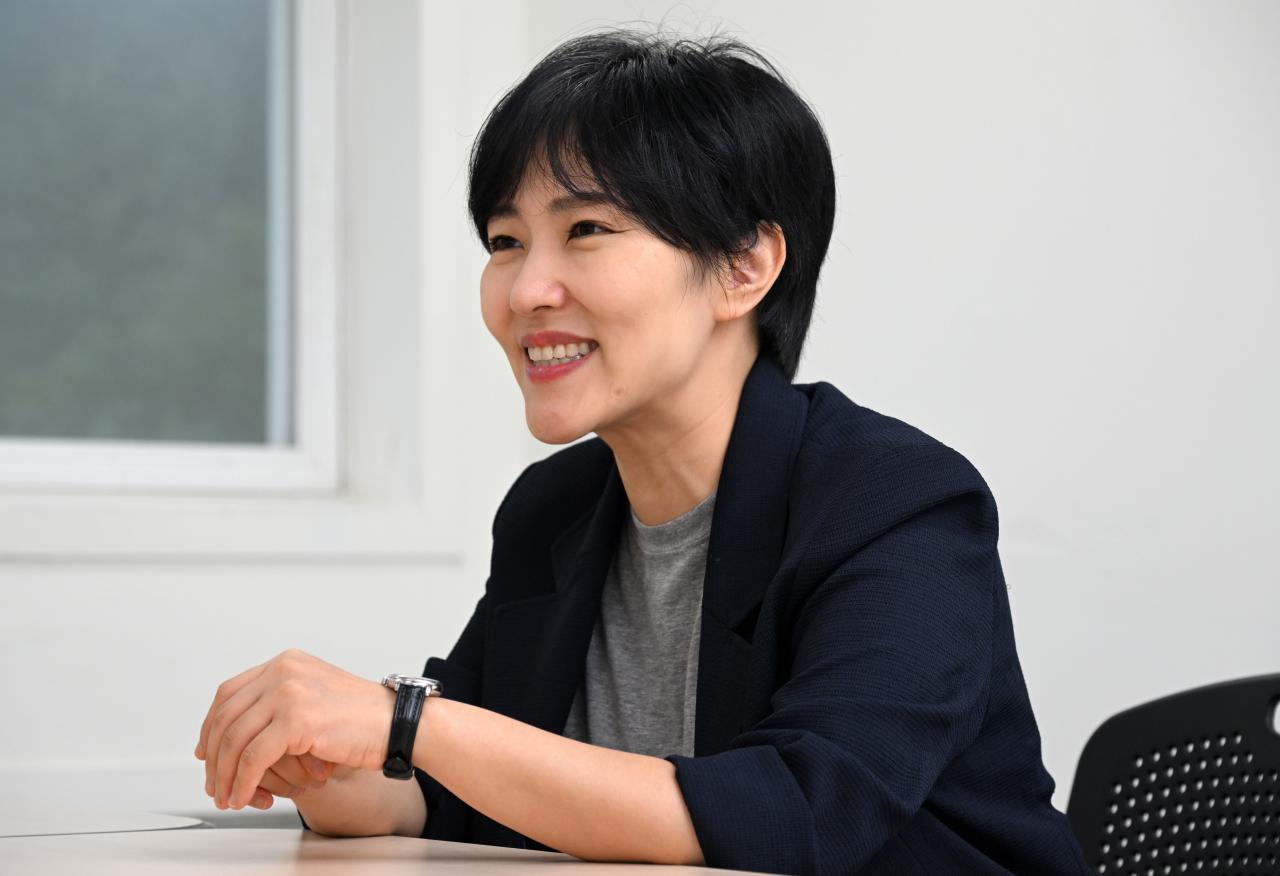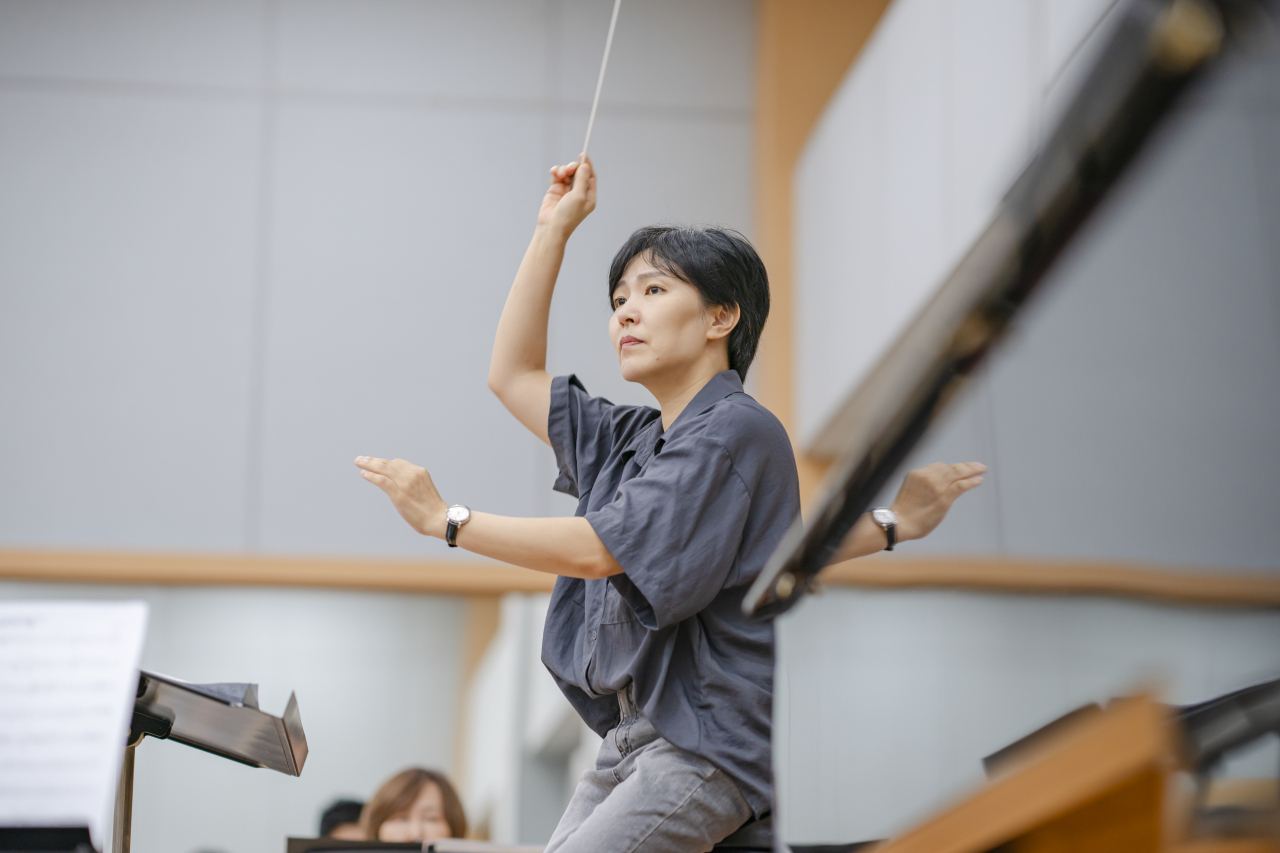 |
Conductor Year Ja-kyung speaks during an interview with The Korea Herald on Aug. 29. (Im Se-jun/The Korea Herald) |
South Korean conductor Year Ja-kyung recently ventured into a new sphere of music when she took the baton for the National Orchestra of Korea, a musical ensemble that specializes in traditional Korean music, on Sept. 1.
Year was the inaugural artist in NOK's "Discovery," a series that delves into traditional Korean orchestral masterpieces from the perspective of accomplished conductors who have built their own unique musical worlds.
"I realized gugak has become something quite different from what I experienced in college. Traditional Korean musical instruments were often not in tune with each other and there was no uniform rhythm, and that was considered a uniqueness of gugak," she recalled. "It seems they have become quite modern and it turned out they can do the same pitch and the rhythm," she said.
Initially, the conductor -- who had received training in Western classical music -- hesitated to step up to the podium for the orchestra, believing it was not her realm. However, once she took the opportunity, she discovered that the art of crafting harmony is, in essence, the same. Besides, Year is not a total stranger to gugak. She learned how to play gayageum, a traditional Korean 12-string instrument played by fingerpicking, along with the piano and the cello as a child. She loved expressing herself and sharing her feelings with others.
“I remember vividly back in the sixth grade when I was speaking in front of the class about something, and I began to see people's faces. Everyone was looking at me, making eye contact and listening, and I thought to myself that I should share more interesting stories, things they'd want to hear,” Year said.
“That feeling from that classroom still sticks with me. So, whenever I'm giving a lecture or conducting a rehearsal in front of an orchestra or ensemble, I always have this thought that I should be saying something for these people to listen to. To make even those who aren't listening pay attention, I sometimes wonder what words I should use," she said. "When people listen and music is created through my words, it really gives me a sense of satisfaction,” she added.
 |
South Korean conductor Year Ja-kyung leads the National Orchestra of Korea, a musical ensemble that specializes in traditional Korean music, during a rehearsal on Aug. 29. (National Theater of Korea) |
Year, 51, believes giving specific directions is conductive to an efficient rehearsal. "Rather than using subjective expressions like, 'Let's try to illustrate this more elegantly,' which could be interpreted differently from person to person, I try to give specific directions like, 'Give an accent for the first note,' 'Reduce the sound so it's lower than this,'" she explained.
After graduating Hanyang University with degrees in composition and conducting, she obtained a master's in conducting from the Vienna University of Music and Performing Arts. She also holds a doctorate in musicology.
Interestingly, the first two characters in her name -- yeo (which she prefers to be spelled "Year") and ja -- happen to mean “woman” in Korean. Though this is a coincidence, the label of female conductor has followed her more than she had expected. For instance, earlier this year, Year was appointed the artistic director of the Daejeon Philharmonic Orchestra, making her the first female conductor to hold that position in the orchestra since it was founded in 1986.
As the field of conducing slowly edges toward gender equality, there will be many "first" female conductors. However, while she comprehends the reasons for the label, the fact that she is a female conductor is merely a coincidence.
“Inevitably, a conductor is a dictator, but has to show leadership in a democratic way now. In the past, conductors used to be very authoritarian, and even if the members had a lot of complaints, they would just be dragged along. However, now members don't budge (if you cannot convince them),” she noted. "The most important thing is that the orchestra members perform with joy, and create a delightful session every day."







![[Today’s K-pop] Blackpink’s Jennie, Lisa invited to Coachella as solo acts](http://res.heraldm.com/phpwas/restmb_idxmake.php?idx=644&simg=/content/image/2024/11/21/20241121050099_0.jpg)